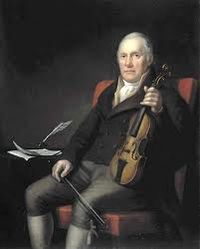Annotation:Marquis of Huntly's Farewell (The)
Back to Marquis of Huntly's Farewell (The)
MARQUIS OF HUNTL(E)Y'S FAREWELL, THE. AKA and see "George Booker (1)." Scottish, Strathspey ("Slow when not danced"). A Major (most versions): D Major (Anderson). Standard tuning (fiddle). AB (most versions): ABAB' (McGlashan): ABAB'AB"AB'" (Skinner). An andante air with "just a touch of strathspey," composed by [{Biography:William Marshall]] (1748-1833). The Marquis of Huntley, George Gordon (b. 1770), was the hereditary heir to the Duke of Gordon and became the 5th and last Duke. This tune was written by Marshall, the Duke of Gordon's steward or butler, who was emotionally moved as the young man took his farewells from his family when he departed for his first Continental tour in 1787. Joseph MacGregor (Memoir of William Marshall, Composer, 1845), records:

…a very tender scene took place at the castle. The elder branches embraced him and expressed their grief in tears and murmurings. The younger children clung to their brother’s knees and arms, and in sharper tones gave vent to their feelings. Marshall was present during this scene, and taking up his violin, immediately produced his beautiful air…he endeavored in the first part to imitate the wailing of the parents, and in the latter bars that of his young sisters.
“The Marquis of Huntley’s Farewell” was one of the earliest pieces composed by Marshall and who published in his First Collection of 1781. It is also a particularly celebrated tune, and one of Marshall’s most famous pieces (Collinson {1966}, for example, was much impressed by it and used it as an example of Marshall's melodic grace and power). The melody was also published by the Gows, with no credit to the composer in their Repository, Part First, 1799. It was included as one of the tunes in a 1921 concert set by the famous Scots violinist J. Scott Skinner, which set was romantically entitled "Spey's Furys;" Skinner was thoroughly familiar with the tune by that time, for his rendition of it gained him a first place prize at a competition held nearly sixty years previously in Inverness in September, 1863. Skinner was not only a noted violinist but, especially early in his career, was a tutor of the national Scottish dances, and had formerly included the melody as one of the pieces in his dance school ball in Forres in 1880.
In America the tune became the precursor for the old-time tune "George Booker (1)," first printed by George P. Knauff in his Virginia Reels, volume III (Baltimore, 1839).
Source for notated version:
Printed sources: Alburger (Scottish Fiddlers and Their Music), 1983; Ex. 54, p. 80. Carlin (The Gow Collection), 1986; No. 133. Collinson (The Traditional and National Music of Scotland), 1966; p. 223. Emmerson (Rantin' Pipe and Tremblin' String), 1971; No. 62, pp. 150-151. Gow (Complete Repository), Part 1, 1799; p. 24. Hardie (Caledonian Companion), 1992; p. 71. Honeyman (Strathspey, Reel and Hornpipe Tutor), 1898; p. 22. S. Johnson (A Twenty Year Anniversary Collection), 2003; p. 30. Kerr (Merry Melodies), vol. 1, c. 1875; Set 10, No. 1, p. 8. MacDonald (The Skye Collection), 1887; p. 1. Marshall, Fiddlecase Edition, 1978; 1822 Collection, p. 14. McGlashan (A Collection of Reels), c. 1786; p. 38. Skinner (The Scottish Violinist), 1900; p. 16. Skinner (Harp and Claymore), 1904; p. 105. Stewart-Robertson (The Athole Collection), 1884; p. 12. Surenne (Dance Music of Scotland), 1852; pp. 48-49.
Recorded sources: Beltona BL2096, Edinburgh Highland Reel and Strathspey Society (1936). HCD 008, Tommy Peoples - "Traditional Irish Music Played on the Fiddle" (appears as 2nd tune, track 5).
See also listing at:
Jane Keefer's Folk Music Index: An Index to Recorded Sources [1]
Alan Snyder's Cape Breton Fiddle Recordings Index [2]
